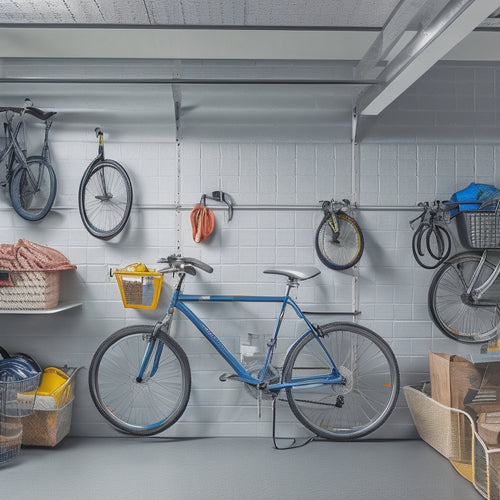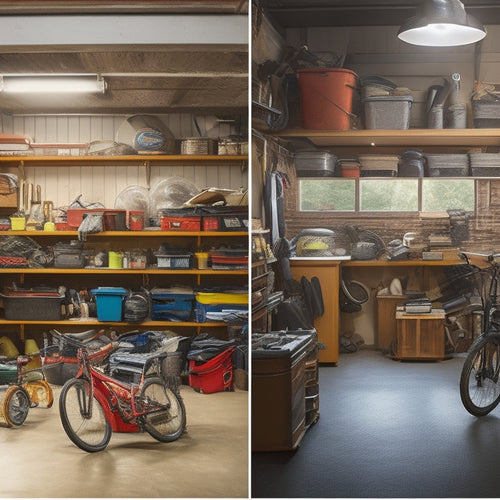
Science Enthusiasts' Homeschool Science Shelf Showcase
Share
We're passionate about creating a homeschool science space that sparks curiosity and enthusiasm in our kids, and we've carefully curated a shelf that showcases our favorite curricula, resources, and tools to make science learning fun and interactive. Our go-to science curriculum, Building Foundations of Scientific Understanding, offers hands-on experiments and engaging lessons that foster dynamic learning. We supplement with workbooks, nature guides, and reference books to keep things fresh and exciting. From science games to apps, and essential equipment like magnifying glasses to microscopes, we've got the tools to make science come alive. Want to see how we bring it all together?
Key Takeaways
• A well-rounded homeschool science shelf should include a mix of core curriculum, hands-on experiment kits, and reference materials for in-depth learning.
• Supplementing with workbooks and online resources like science podcasts and interactive simulations can keep kids engaged and curious.
• Nature guide books and outdated materials can provide valuable lessons on the evolving nature of science and changing discoveries.
• Essential science equipment like magnifying glasses, microscopes, and mineral samples can facilitate hands-on learning and exploration.
• A homeschool science shelf should be dynamic, with materials regularly updated to reflect new scientific discoveries and advancements.
Our Favorite Science Curricula
We've had the pleasure of trying out several full science curricula programs, and currently, we're thoroughly enjoying Building Foundations of Scientific Understanding (BFSU), which has proven to be both engaging and informative for our kids.
BFSU offers hands-on experiments and engaging lessons that make science come alive for our children. We appreciate how it fosters dynamic science learning, acknowledging that science is an evolving field.
Our kids are excited to explore and learn with BFSU, and we're confident that it's laying a strong foundation for their future scientific pursuits. With BFSU, we're able to provide our kids with a well-rounded science education that's both fun and interactive.
Supplementing With Workbooks and More
While our core science curriculum provides a solid foundation, we also like to supplement with additional resources to keep our kids engaged and curious.
We have workbooks on hand, but we prefer hands-on experiments over workbook pages. We've tried using workbooks like Start Up Science, but they just can't replace the excitement of real-life science.
We've found that our kids learn best when they're actively participating in experiments and activities. To support this, we also have reference books and other miscellaneous resources that we draw upon as needed.
We've even inherited some outdated nature guides from parents, which serve as a reminder that science is a dynamic field that's constantly evolving.
Nature Guides and Reference Books
In addition to our core curriculum, we rely on nature guide books and reference materials to provide in-depth information on specific topics and foster a deeper understanding of the natural world.
We've been fortunate to have some of these books donated by parents, which we use as great references for specific units. While some material may be slightly outdated, we use it as an opportunity to teach our kids about evolving science and how new discoveries can change our understanding of the world.
These books aren't used daily, but they're valuable when we need them. They help our children understand science as a dynamic field that's constantly changing and improving.
Additional Science Resources and Tools
Beyond our core curriculum and reference books, we've assembled a collection of additional resources and tools that help bring science to life and make learning more engaging and interactive. These tools are essential in making science enjoyable and accessible for our kids.
| Resource | Description | Usage |
|---|---|---|
| Science Book Recommendations | Books that spark curiosity and interest | Supplement main curriculum |
| Online Science Platforms | Interactive simulations and virtual labs | Incorporating technology |
| Science Podcasts | Engaging stories and real-life examples | Car rides and downtime |
| Science Games | Fun ways to learn scientific concepts | Family game nights |
| Science Apps | Interactive and visual learning aids | On-the-go learning |
Essential Science Equipment and Kits
We've carefully curated a selection of essential science equipment and kits that provide hands-on opportunities for our kids to explore, experiment, and learn. Magnets, prisms, and mineral samples are staples in our homeschool, used to supplement specific lessons and encourage curiosity.
We've found that magnifying glasses and pocket microscopes are affordable and versatile tools that facilitate hands-on learning. For more in-depth exploration, we recommend investing in a reasonably priced compound microscope.
Science activity kits are also a great way to conduct engaging science experiments, making complex concepts more accessible and fun for our kids. By incorporating these essential equipment and kits, we create an environment that fosters a love for science and promotes hands-on learning experiences that our kids will cherish.
Frequently Asked Questions
How Do You Balance Structured Lessons With Hands-On Exploration?
We strike a balance between structured lessons and hands-on exploration by intentionally setting aside time for spontaneous discovery, while still using textbooks as a foundation, ensuring our kids get the best of both worlds.
Do You Have a Dedicated Space for Science Experiments and Activities?
We designate a specific area for science experiments, utilizing storage bins and shelves to keep materials organized, and establish routines to maintain a smooth shift between activities, setting boundaries to uphold a clutter-free space.
How Do You Handle Safety Concerns During Hands-On Science Experiments?
As we venture into the unknown, we prioritize safety, establishing protocols and emergency responses before experiments. We suit up with protective gear, lab equipment at the ready, ensuring our curiosity is matched by caution.
Can You Recommend Any Science Apps or Online Resources for Homeschoolers?
We love exploring best science apps and online resources, which offer engaging virtual experiments and activities, perfect for supplementing our homeschool curriculum, and we're always on the lookout for new ones to try!
How Do You Encourage Scientific Thinking and Critical Analysis in Your Children?
We foster scientific thinking by embracing STEM challenges and group discussions, while encouraging nature walks and recording observations in scientific journals, helping our kids think critically and develop a curious, analytical mindset.
Related Posts
-

7 Best Garage Storage Solutions for Busy Families
You're tired of a cluttered garage, and it's time to reclaim your space. As a busy family, you need storage solutions...
-

Transform Your Cluttered Garage With Proven Systems
You're sitting on a cluttered garage's hidden potential, and by implementing the right combinations of strategies and...

